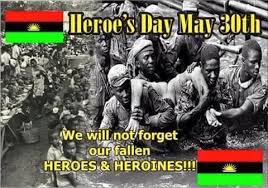The 30th May of every year has been set aside as a day every Biafran must sit back at home and pay tributes to the heroes and heroin who pai...
The 30th May of every year has been set aside as a day every Biafran must sit back at home and pay tributes to the heroes and heroin who paid the ultimate price to defend the millions of people from southeastern Nigeria who faced genocide by Nigeria with the help of some other foreign allies like the UK.
30th May stands as a solemn day of remembrance, designated by the Indigenous People of Biafra (IPOB) as a Memorial Day to honor the countless lives lost during and after the Biafran genocide. It is a national day of mourning, reflection, and recognition of the immense sacrifices made in the quest for freedom.
The Biafran War, also known as the Nigerian Civil War, erupted in July 1967 when the southeastern region, predominantly inhabited by the Igbo people, declared independence as the Republic of Biafra. This declaration was a response to long-standing ethnic tensions, political marginalization, economic inequalities, and the unprovoked ethnic cleansing of the Igbo population.
For 30 harrowing months, the conflict consumed the region, leading to the deaths of an estimated six million people, most of them innocent civilians. Starvation, disease, and the brutal realities of war claimed lives at an unimaginable scale, leaving scars that still linger in the hearts of Biafrans today. Though the war officially ended in January 1970, its legacy of suffering and resilience endures.
On 30th May, Biafrans around the world pause to remember the heroes and heroines who stood against oppression and the millions who perished in the struggle for self-determination. It is a day not only to mourn the past but to reflect on the continued fight for justice, identity, and recognition.
In 2025, we will observe the Day as we have always done. The Discussion on self-determination must continue to be disseminated through every Media house, as nothing has changed since 1970, following the end of the war.
A secret gorilla war is still ongoing in Biafraland, as the issues that led to the agitation for a sovereign state of Biafra persist to this day. The unprovoked ethnic cleansing of the indigenous People of Biafra is still on. The negligence of the 3R policy of Reconciliation, Reconstruction and Rehabilitation, which the then government put in place to erase the scars of war, has been one of the primary reasons for the resurgence of Biafra uprisings. The failure of Nigeria to implement this policy is partly responsible for the Movement of the Indigenous People of Biafra (IPOB). 30th May serves as a poignant reminder of a challenging past and a beacon of hope for the future.
Among those who perished were countless unsung heroes and heroines—soldiers, mothers, children, medics, and activists—who faced the harsh consequences of a war driven by political apathy and ethnic strife. Their stories, often overlooked in mainstream historical accounts, continue to resonate in the hearts and memories of their descendants.
30th May has evolved into more than just a day of remembrance; it stands as a powerful symbol of identity, resistance, and unity for Biafrans and the broader Igbo community. On this day, you'll find that markets, businesses, and public transport often come to a halt across southeastern Nigeria, all in respect of a solemn sit-at-home directive from IPOB. Vigils, prayers, and educational events are held to honour those who have fallen.
But this day is about more than just symbolism; it serves as a wake-up call. It's a time for us to reflect on the core values of justice, freedom, and self-governance—principles that fueled the Biafran movement and continue to inspire current struggles against marginalization.
The Biafrans in the diaspora play a crucial role in keeping the spirit of 30th May alive. From London to Houston, Johannesburg to Berlin, Biafran communities come together to organize remembrance marches, symposiums, and cultural exhibitions. Social media has also emerged as a powerful platform for raising awareness, especially among younger folks who may not have experienced the war firsthand but still carry its legacy.
Honoring the Past, Shaping the Future and remembering those we've lost isn't just about nostalgia; it's a pledge to learn from our history. The legacy of Biafra challenges not only Nigeria but all post-colonial nations to scrutinize how inequality sows the seeds of conflict and how we must cultivate peace through dialogue, inclusion, and justice.
For the Indigenous People of Biafra and their supporters, 30th May serves as a sacred reminder that the path to self-determination is still ongoing. It's a day where history intertwines with hope—a hope that the sacrifices made in the past will not be forgotten and that a future grounded in equity and dignity is within reach.
In conclusion, as the sun rises on 30th May, 2025, a profound silence blankets southeastern Nigeria, speaking volumes without uttering a single word. This silence is filled with remembrance, sorrow, and pride—a moment when the community takes a step back to honor their heroes and heroines. There are no fireworks or grand celebrations, just a deep, quiet commitment to keep their memories alive.
May their memories be a source of blessing. May we never forget their sacrifices. And may the future they envisioned continue to inspire generations yet to come.
Written by
Odi O
Edited by
Oby M
For Enugu States Media Team













No comments